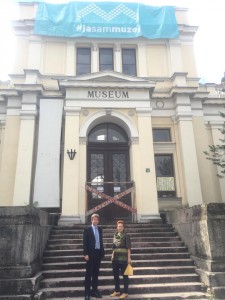3rd September 2015
Agents of Change
I was recently asked to speak at an event about the future of Bosnia and Herzegovina. I was the only speaker. I was happy to be there, but to be honest I thought it was a bit odd. I’m a foreign diplomat who has lived here for a year. Why should I be better qualified to talk about the future of this country than a local politician? Or, for that matter, anyone else who was born and raised here? Even better, what about some young people? They are the future of this country, not me.
I’m being a bit unfair. The organisers wanted me to talk about the new EU strategy, which I hope very much will indeed help BiH to make real progress towards a more stable and prosperous, European future. But even so, I think it points to an interesting reflex in the political life of this country, which is still, 20 years after the war, often to look outside for ideas and for leadership. And it highlights too the fact that young people in BiH do not have the voice that they deserve in shaping their future.
The thing is that I don’t believe for a moment that there is a shortage of ideas. I meet all sorts of fascinating people with strong opinions about what needs to change. The problem is not the ‘what’, but the ‘how’. Many people – particularly young people – tell me that they have lost faith in the political system to deliver that change. Some fear the consequences of speaking publicly about the economic and social challenges they face on a daily basis. And so many of them are opting out. They don’t vote. And, all too often, they want to leave BiH to pursue the opportunities they are denied here.
I can understand the frustration. But if you don’t vote, then you are effectively voting for the status quo. And if you walk away from BiH altogether, then you are missing the opportunity to play a part, however small, in shaping the future of your country. You don’t have to be a politician to be a leader. Ordinary people can be agents of change.
Over the past year I have seen how ‘people power’ can and does make a difference in BiH. The EU’s new strategy didn’t come from nowhere. It was a direct response to last year’s protests. We heard a clear message that ordinary people are fed up with corruption. That they want jobs and justice. And we responded. More importantly, your politicians are responding too. They recognise that people are running out of patience. That empty nationalism doesn’t put food on the table. And so the State and Entity Governments have now signed up to the most positive and ambitious reform agenda since the end of the war. It’s an exciting moment, and one that gives me real hope for the future.
There are other examples too. I recently visited the National Museum for the first time. It’s an amazing place, full of treasures that tell an important story of centuries of peaceful coexistence in BiH. I went to support the #jasammuzej movement, which is campaigning for the museum to be reopened and put on a sustainable financial footing. #Jasammuzej happened because four women were fed up with the museum being held hostage to political infighting. Just four. And they’re getting real traction. Hundreds of people have joined the cause and volunteered to help out in the museum. And now, finally, it seems that we may be close to a political agreement that could see the museum re-open its doors. I can’t wait.

And what a great few weeks it has been for sport. Last week, my Embassy team cheered on Amel Tuka to win his bronze medal at the World Championships in Beijing. And, of course, there was that wonderful moment when the BiH Under 16 basketball team won the European Championship. The public reactions showed how much people are crying out for positive stories and for success. I was one of the many thousands of people squeezed into the streets of Sarajevo to welcome back “the pride of the country”. Džanan, Njegoš, Sani, Emir, Lazar, Amar, Vedran, Aljoša, Srđan, Adi, Timur, Nikola. They show what this country could become. And now, it seems, their success may stimulate a serious political debate about how governments can better support sport and the arts.

These examples show that change is possible, and that the best catalysts are often not politicians or foreign diplomats, but ordinary people. It’s amazing what a few organised and determined people can achieve. But if young people are to be convinced that change is really possible, they will need lots more such role models. So if you are an agent of change, or if you know someone who is doing amazing things, whether for their local community or for their country, then get in touch. I’d love to hear about it and perhaps to come and visit.
And for those of you who want a better future, but don’t know where to start, it doesn’t matter if you can’t find a political party to support. Support an issue that matters to you. And if you can’t think of anything else, then support the reform agenda. Because politicians need to hear more clearly the voices of ordinary people. Not the voices of the privileged few who want to preserve the unjust and unsustainable status quo. But the voices of the many who want change, and who want it fast. And perhaps next time they want someone to talk about the future of this country, it could be you.
Maybe BiH companies should also consider and reply to young people from dijaspora when we are applying for jobs there! Corruption is awful in BiH still. I have very good CV (education and professional experience from Scandinavia) and I got 1 reply only a cuople years ago when I was applying for a couple dozen jobs in Sarajevo. It’s not true that people want only to leave BiH, I’m sure there are more of me like who are fed up living away from home (and pay expensive western rent everywhere, big reason 🙂 for 20 years already but we have old school dinosaurs still as leaders in too many places which don’t understand modern world dynamics and opportunities.
Many thanks Rijad, and I wholly agree that sustainable economic growth for BiH – and the new jobs that will come with it – will be built primarily on the private sector, and particularly on the success of small and medium-sized businesses. BiH needs to become a country of entrepreneurs. The Reform Agenda is heavily focused on improving the business climate, in order to attract domestic and foreign investment. See my previous blog called “Jobs, jobs and jobs” for more on this. Best, Edward
Your Excellency
Bosnia is area for testing. Maybe you have a right about changes which could be stated by ordinary rational people, but would every country who is signatory of Dayton settlement to liberate BH by Achilles’ heel (read – entities). I think that some type of presidental system as in USA and “non party involvement” are solution for Bosnian 20-years crisis. But really, you must educate people that isn’t solution in employment in state administration nor to work somewhere in abroad, than that solution is in private sector. I think that you need to make these two campaigns. Best regards